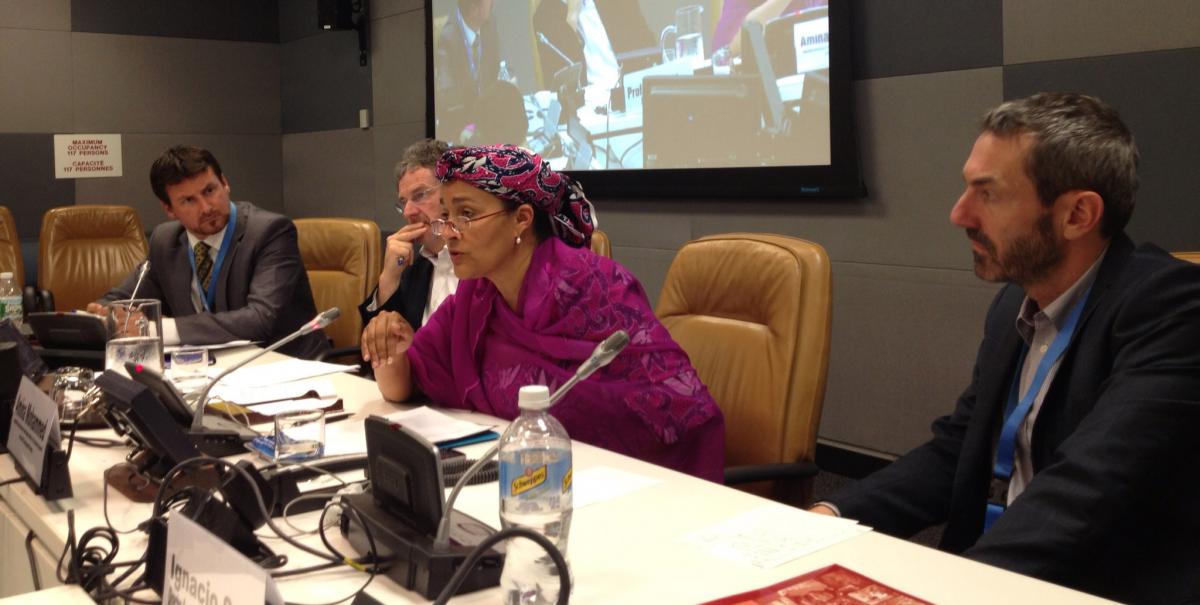Video: UNDP seminar 'Twenty years later: The Paris Principles and the national human rights institutions'
 Last month, CESR Executive Director Ignacio Saiz joined a panel discussion on the way forward for national human rights institutions (NHRIs) in the post-2015 development agenda. Hosted by the United Nations Development Programme (UNDP), the panel was part of a seminar for NHRIs to commemorate the 20th Anniversary of the Paris Principles, the normative framework that defines the role, composition, status and functions of these institutions.
Last month, CESR Executive Director Ignacio Saiz joined a panel discussion on the way forward for national human rights institutions (NHRIs) in the post-2015 development agenda. Hosted by the United Nations Development Programme (UNDP), the panel was part of a seminar for NHRIs to commemorate the 20th Anniversary of the Paris Principles, the normative framework that defines the role, composition, status and functions of these institutions.
Accountability gaps have impeded the realization of the Millennium Development Goals (MDGs). And while NHRIs have often been cited as key mechanisms for filling these gaps, their comparative strengths and weaknesses in this regard have only recently been explored in depth.
As debates on what the post-2015 framework should look like progress, there are clear expectations that NHRIs will form part of the accountability infrastructure supporting it. But what should NHRIs do specifically? CESR suggested four broad proposals for NHRIs to consider:
- Contributing to global decision making on the post-2015 framework: Most immediately, NHRIs can more actively contribute to debates about the content of the new framework. The positions of member states are currently being defined. NHRIs, individually and collectively, can seek to influence the positions drawn up by their countries and other relevant actors, so as to ensure that the new development commitments are firmly grounded in international human rights standards.
- Engaging in the process of tailoring goals, targets and indicators nationally: There is increasing consensus that while a framework of internationally-agreed goals should be universal, targets need to be ‘tailored’ to the national level. NHRIs can ensure that this tailoring exercise is undertaken through a participatory process and that it takes their country’s human rights commitments fully into account. Specifically, NHRIs can ascertain that their country’s national targets are ambitious and achievable within a defined timeframe and can develop indicators and other monitoring tools to measure whether policies are effective and that outcomes are distributed equally among all sectors of society.
- Monitoring and reviewing progress on agreed commitments: The importance of establishing robust country-owned monitoring mechanisms to periodically review progress (or lack of) towards agreed goals and targets is broadly recognized. This kind of periodic review would fit well with the reporting mandate many NHRIs’ already hold, and they are well-placed to actively contribute to such mechanisms, for example by facilitating community participation or submitting their own ‘shadow’ reports. At the international level, too, NHRIs can play a key role, as an independent source of information for any new international monitoring mechanism and by encouraging greater scrutiny by existing human rights mechanisms such as treaty bodies and special rapporteurs.
- Enforcing accountability and enabling access to justice and remedies: NHRIs have not only a monitoring role but also an enforcement function. Their enforcement powers may derive from NHRIs’ quasi-judicial complaint mandates, investigative capabilities or even by strengthening other enforcement mechanisms through training and guidance. This is important for backstopping and reinforcing accountability, ensuring access to justice for people whose rights are denied because of a failure to meet development commitments.
It is clear that NHRIs have a lot to contribute to the post-2015 development framework. Their unique placement between the government and civil society, their legal mandate and the powers that derive from it, as well as their particular human rights expertise gives them huge potential to guarantee that the post-2015 framework has human rights at its core and that states can be held accountable for their commitments under it.
Despite many good practice examples—some of which are highlighted in the report Who Will Be Accountable?—experience of NHRI engagement with the MDGs and with development policies more generally shows uneven results. The degree of success an institution will have depends on a number of legal, political, financial and social factors that affect it both internally and externally. CESR continues to work with NHRIs and their networks across the world to build internal capacity, as well as strengthen their external relationships, so as to help them meet the expectations placed on them in the post-2015 context.